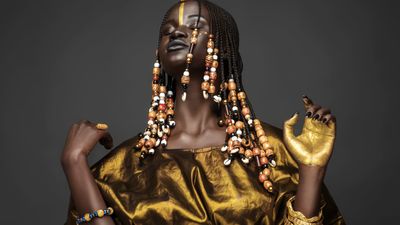Khoudia Diop Celebrates Her Nyenyo Culture In This Stunning Photo Series
Khoudia Diop shares the love she has for her Nyenyo heritage in this new photo series to celebrate Senegal's independence day.
Khoudia Diop, aka Melanin Goddess, shares her love for traditional Senegalese wear and her Wolof heritage in this gorgeous photo series.
Titled, NYENYO, the name of the caste her family originates from in Senegal, she represents an element of her identity she's not only proud of but embraces fully—and looks like a queen while doing it.
"Nyenyo, also known as 'teug' or 'ngengo,' are the blacksmiths and metalworkers of the Senegalese caste system. In her family’s case, they are jewelry makers and gold workers," Victory Jones of The Colored Girl says in a press release. "Although caste systems are used as a stringent class system, and cultural identifier to maintain hierarchy in many different cultures in parts of the world, Khoudia embraces her Nyenyo heritage and doesn’t see the label as a hindrance. Rather, she sees it as part of the fabric of her identity, her family’s history and the overall story of her people."
Diop indeed has a family history to be proud of. Her grandfather helped build the Malaaw monument in Dakar.
"The monument is a giant horse and represents loyalty between the kings and their animals (horses)," she says.
Check out more highlights from her Q&A with The Colored Girl and images from NYENYO below.
On what she remembers most about Senegal before she moved to Paris:
What I remember most, is the diversity within the Senegalese culture (cultures, traditions, beliefs). I also remember the great pride we have for our traditional clothing; while still loving to wearing modern fashion. Very inspiring! Oh, and also the food. I love Senegalese food! My mom makes some of the best. My favorite dish is “thiebou djeun” (fried fish and rice). So yummy—everyone should try it!
On what life is like in Senegal:
Life is very relaxed in Senegal. Basically, we don’t worry about many things, and it's called the country of "teranga" (welcome) where everybody cares about their neighbors.
How her Senegalese roots informs her beauty standards:
I was taught to carry myself as a Senegalese woman—with respect for her elders and heritage; honor, and really about the woman you are, and how you carry yourself and treat others. This is why I think beauty is much more than appearance—it’s the way you care about yourself and others.
[oka-gallery]
On the traditional clothes she wears in the NYENYO photo series:
They represent the Muslim side of Senegalese women—what queens used to wear. And for nyenyo, the jewelry was so they could be identified as wealthy, and attractive or sexy. Also, the black tattoo lip was a trend that use to take place at the middle of a village. It was a sign of beauty, bravery and “obedience!” You would dishonor your whole caste, and family if you ran during the painful process of getting the tattoo. Some women were even beaten by their parents to get it done! It’s seen as a sign of respect, value and beauty.
On the significance of the the NYENYO photo series:
My Senegalese roots mean so much to me—it’s very personal. I love my country, my culture, my heritage. It is home and also a major part of who I am. I discovered so much about myself, and my culture has had a huge impact and importance, on my journey to self-love—from loving my upbringing, to the bullying then seeing the world outside of Senegal. Are there things I would change? Sure, but there are also certain things that I cherish about being Senegalese (Wolof woman).
On what Senegal's independence means to her:
It means a lot to me—we're free from certain restrictions placed on us, and can do what we dreamed about as a people, and most importantly really express and be ourselves!
On the Senegalese women she looks up to:
Mariama Ba, author and feminist, and the Nder women. The Nder women defended their village when enemies attacked because their men were gone!
Credits
Model/Muse:Khoudia Diop
Photographer:Joey Rosado
MakeUp Artist:Moshoodat Sanni
Creative Direction/Agency:The Colored Girl
Article written by: Victory Jones
- Lagos Fashion Week Patrons Check the 2020 Runway Styles ... ›
- Stephen Tayo Is the Fashion Photographer Capturing the Effortless ... ›
- Top 11 African Female Models To Watch - OkayAfrica ›
- "Being Black is Lit:" Talking #BlackGirlMagic with the Melanin Goddess ›
